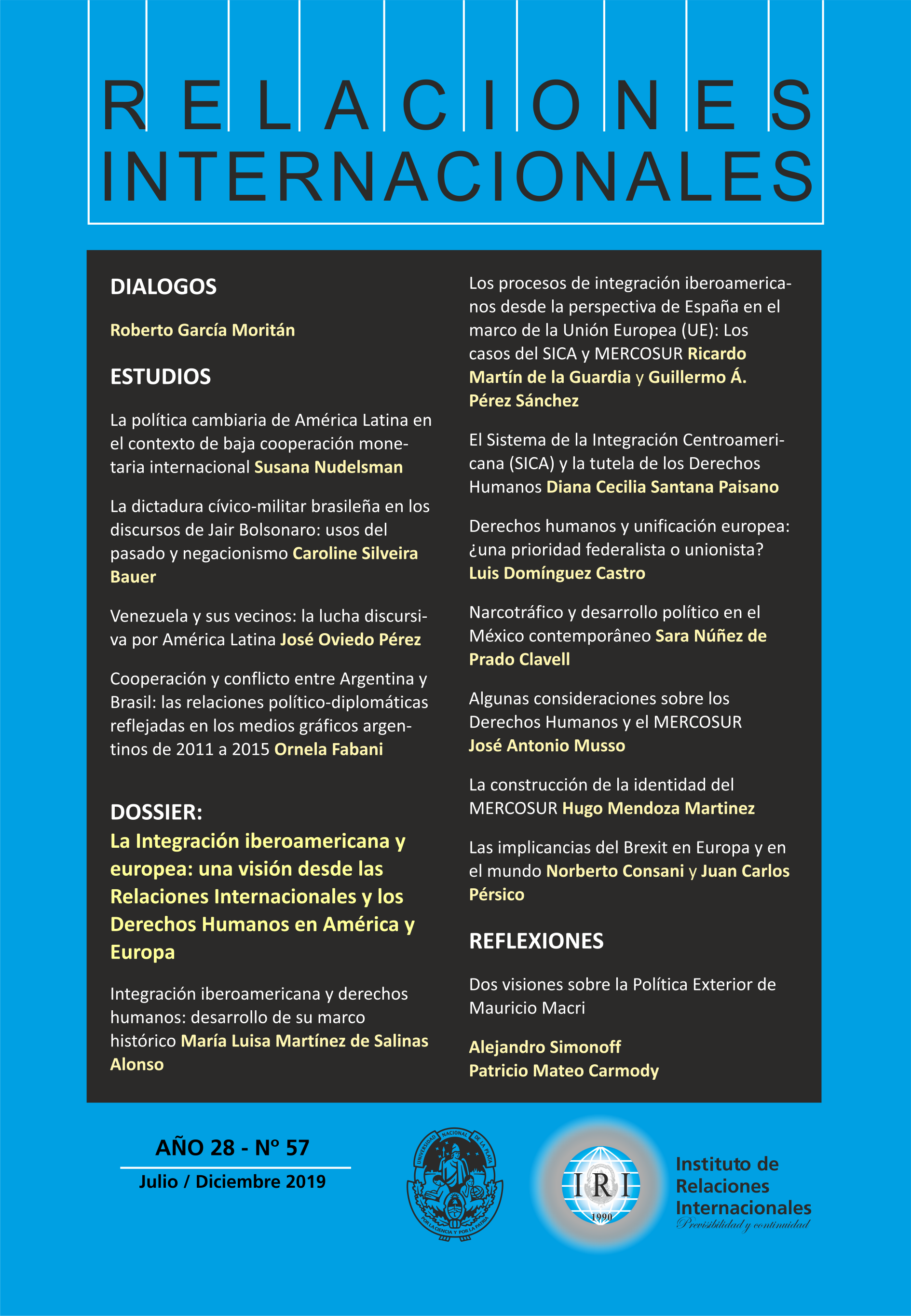Venezuela y sus vecinos: la lucha discursiva por América Latina
DOI:
https://doi.org/10.24215/23142766e071Palabras clave:
Venezuela, América Latina, postestructuralismo, Guerra Fría, elaciones internacionalesResumen
Durante la última década, Venezuela ha entrado en una profunda recesión, que ha provocado que millones emigren al extranjero. En febrero de 2019, los Estados Unidos y sus aliados reconocieron al gobierno interino de Juan Guaidó, creando un enfrentamiento con el gobierno Chavista de Nicolás Maduro. Este artículo realiza un análisis profundo de la situación en Venezuela a través de múltiples niveles al problematizar nuestra comprensión ontológica de individuos, estados y el sistema internacional. Con un enfoque postestructuralista de la seguridad, sostengo que los individuos han sido retratados en discursos humanitarios contradictorios de tal manera para promover intereses políticos particulares. Además, analizo críticamente el papel del espacio, el tiempo y el multilateralismo, y sus efectos posteriores para el orden mundial del siglo XXI.
Descargas
Citas
Alexander,M.Jacqui(1994)“NotJust(Any)BodyCanBeaCitizen:ThePoliticsofLaw,Sexual-ityandPostcolonialityin Trinidad andTobagoandtheBahamas”,Feminist Re-view, Vol. 48, pp.5-23.
Ashley, Richard (1989) “Living on Border Lines: Man, Poststructuralism, and War”, in, James DerDerianand Michael J. Shapiro,eds.,International/Intertextual Relations:PostmodernReadingsofWorldPolitics,NewYork:LexingtonBooks,pp.259-322.
Balderacchi, Claudio(2017)“Participatory Mechanismsin Bolivia,EcuadorandVenezuela: DeepeningorUndermining Democracy”?Government and Opposition, Vol. 52, No. 1, pp. 131-161.
Burkholder,Mark and Johnson,Lyman(2010)ColonialLatin America, 7thed,Oxford: OxfordUniversity Press.
Butler,Judith(1993)BodiesThatMatter:OnTheDiscursiveLimitsof‘Sex’,NewYork:Routledge.
Campbell,David (1992)WritingSecurity:United StatesForeignPolicy andthePoliticsof Iden-tity, Minneapolis: UniversityofMinnesota Press.
Casey,Nicholas (2019) “TheVenezuelaBattleBorder”,The New YorkTimes,25 Feb,available at: https://www.nytimes.com/2019/02/25/world/americas/venezuela-bor-der-photos.html accessedon: 15 May 2019.
CaraLabrador, RosioandMerrow,William (2019) “The VenezuelanExodus”,Councilon For-eignRelations,5 Mar, availableat:https://www.cfr.org/article/venezuelan-exodus?fbclid=IwAR0FSLxjK7RMobAwd_ptqbAJDM10HZvdKcZSAI3MFdZak- FNmRiSm6ecWqrA accessedon: 23 May 2019.
Centeno,Miguel(2002)BloodandDebt:WarandtheNation-StateinLatinAmerica,Univer- sityPark:PennsylvaniaStateUniversityPress.
Corrales, JavierandPenfold, Michael(2007)“Venezuela:CrowdingOut theOpposition”,Jour-nal of Democracy, Vol. 18, No. 2, pp.99-113.
Corrales,JavierandPenfold,Michael(2011)DragonintheTropics:HugoChávezandthePo-liticalEconomyofRevolutioninVenezuela,Washington,D.C.:BrookingsInsti- tutionPress.
Dalby,Simon(1992)“Security,Modernity,Ecology:TheDilemmasofPost-ColdWarSecurity Discourse”,Alternatives:Global,Local,Political,Vol.17,No.1,pp.95-134.
DerDerian,James(2009).“Theterroristdiscourse:Signs,states,andsystemsofglobalpoliti-calviolence”,in,JamesDerDerian,ed.,CriticalPracticesinInternationalThe-ory:Selected essays, London:Routledge,pp.68-96.
DerDerian,James (2009) “The value ofsecurity: Hobbes,Marx,Nietzsche,andBaudrillard”,in, mesDerDerian,ed.,CriticalPracticesinInternationalTheory: Selectedessays, London:Routledge,pp.149-166.
DerDerian,James andShapiro, Michael, eds.,(1989)International/Intertextual Relations:PostmodernReadings ofWorldPolitics, New York: Lexington Books.
Derrida, Jacques(1997)OfGrammatology, Baltimore:The JohnsHopkins University Press.Doty,RoxanneLynn (1993)“Foreign Policyas SocialConstruction:APost-PositivistAnalysis of U.S. Counterinsurgency PolicyinthePhilippines”,InternationalStudiesQuar-terly,Vol. 37, No. 3, pp. 297-320.
ElComercio(2019)“Líderesdel mundocelebranyrepudianellevantamiento militaren Vene-zuela”,30 Apr,availableat:https://elcomercio.pe/mundo/venezuela/vene- zuela-lideres-mundo-celebran-repudian-levantamiento-militar-juan-guaido- leopoldo-lopez-nicolas-maduro-noticia-631116 accessedon: 15 May2019.
Ellner, Steve (2010) “Hugo Chávez’s First Decade in Office: Breakthroughs and Shortcomings”,
Latin American Perspectives, Vol. 37, No. 1, pp. 77-96.
Ellner,Steve (2019)“ExplanationsfortheCurrent Crisis in Venezuela: A Clash ofParadigmsandNarratives”,GlobalLabour Journal, Vol. 10, No. 2, pp. 159-169.
Finnemore, Martha(1996)“ConstructingNorms ofHumanitarian Intervention”,in, Peter Kat-zenstein,ed,TheCultureofNationalSecurity:NormsandIdentityinWorldPol-itics,New York: ColumbiaUniversity Press,pp.153-185.
Finnemore, MarthaandSikkink, Kathryn(1998)InternationalNorm Dynamics andPoliticalChange,Cambridge:CambridgeUniversity Press.
Foucault,Michel(1977)Discipline and Punish: TheBirthofthePrison, AlanSheridan (trans),New York: VintageBooks.
Foucault,Michel(1978)TheHistoryofSexuality,Volume1:AnIntroduction,NewYork:Pan-theonBooks.
Foucault,Michel(1980)Power/Knowledge:Selected Interviews and Other Writings 1972-1977,New York:PantheonBooks.
Fukuyama, Francis (1992)The End of History and the Last Man, New York: Free Press.
Galeano,Eduardo(1997)Open Veins of Latin America, New York:MonthlyReviewPress. Hansen
,Lene (1997) “A Case forSeduction? EvaluatingthePoststructuralist Conceptualiza-
tion of Security”,Cooperation and Conflict, Vol. 32, No. 4, pp. 369-397.
Krause,KeithandWilliamsMichael,eds.(1997)CriticalSecurityStudies:ConceptsandCases,Minneapolis:University ofMinnesotaPress.
Laclau,ErnestoandMouffe,Chantal(2001)HegemonyandSocialistStrategy:TowardsaRad-ical DemocraticPolitics, 2ndEd, London:Verso.
Mares,David(2001)ViolentPeace:MilitarizedInterstateBargaininginLatinAmerica,New York:ColumbiaUniversityPress.
Mares,DavidandKacowicz,Arie,eds.(2016)RoutledgeHandbookofLatinAmericanSecurity, London:Routledge.
Michael,Reid (2007)Forgotten Continent:TheBattlefor Latin America’s Soul, New Haven: YaleUniversity Press.
Mignolo, Walter (2005)The Idea of Latin America, Malden: Blackwell.
Mitzen, Jennifer(2006)“Ontological SecurityinWorld Politics:State Identity and theSecurity Dilemma,”EuropeanJournalofInternationalRelations,Vol.12,No.3,pp.341-370.
McCoy,Jennifer andMyers,David (2004)The Unraveling ofRepresentative DemocracyinVenezuela,Baltimore:The JohnsHopkins University Press.
Nail, Thomas (2016)Theory of the Border, Oxford: Oxford University Press.
O’Grady, Siobhán,ChrisAlcantara,and ArmandEmamdjomeh(2019)“Venezuela’s crisisin 5charts”,TheWashingtonPost, 26 Jan,availableat:https://www.washing- tonpost.com/world/venezuelas-crisis-in-5-charts/2019/01/26/97af60a6-20c4- 11e9-a759-2b8541bbbe20_story.html?noredi- rect=on&utm_term=.af970d5491df accessedon: 23 May 2019.
Onuf, Nicholas (1995) “Levels”,European Journal of International Relations, Vol. 1, No. 1, pp.
-58.
Ramsey,Geoff andSánchez-Garzoli,Gimena (2018)“Respondingto an Exodus: Venezuela’sMigrationandRefugee Crisisas Seen fromtheColombianandBrazilianBor-ders”,WOLA,availableat:https://www.wola.org/analysis/responding-exodus-venezuelas-migration-refugee-crisis-seen-colombian-brazilian-borders/ ac- cessedon: 10 May 2019.
Schoultz,Lars(1998)BeneaththeUnitedStates:AHistoryofU.S.PolicytowardsLatinAmer-ica,Cambridge: Harvard UniversityPress.
Shapiro, Michael(1997)ViolentCartographies:Mapping Cultures of War,Minneapolis:Uni-versityofMinnesotaPress.
Shapiro, Michael(2007) “The New ViolentCartography”,Security Dialogue, Vol. 38, No. 3, pp.
-313.
Shapiro, Michael (2009)Cinematic Geopolitics, London: Routledge.
Smith,Peter (2008)Talons oftheEagle: LatinAmerica,theUnitedStates,andtheWorld,3rdEd.,Oxford: Oxford University Press.
Solomon,Ty (2015)The Politics ofSubjectivityinAmericanForeignPolicyDiscourses, Ann Ar- bor:UniversityofMichiganPress.
Tsavkko Garcia,Raphael (2018)“Brazil’sClosed-DoorPolicy”,Foreign Policy, 28Sep,availableat: https://foreignpolicy.com/2018/09/28/brazils-closed-door-policy-vene- zuela-refugee/ accessedon: 25 May2019.
Vaughn,Jocelyn(2009) “TheUnlikely Securitizer: Humanitarian OrganizationsandtheSecu-ritizationofIndistinctiveness”,Security Dialogue, Vol. 40, No. 3, pp.263-285.
Walker, R.B.J.(1993)Inside/Outside: InternationalRelations asPoliticalTheory,Cambridge:CambridgeUniversityPress.
Waltz,Kenneth(1959)Man,theStateandWar:ATheoreticalAnalysis,NewYork:ColumbiaUniversityPress.
Weber, Cynthia(1999)Faking it: U.S. Hegemony in a “Post-Phallic” Era,Minneapolis: Univer- sityofMinnesota Press.
Descargas
Publicado
Cómo citar
Número
Sección
Licencia
Aquellos autores/as que tengan publicaciones con esta revista, aceptan los términos siguientes:
- Los autores/as conservarán sus derechos de autor y garantizarán a la revista el derecho de primera publicación de su obra. A partir de noviembre del 2020 los artículos se publicarán en la revista bajo una licencia Creative Commons Atribución- NoComercial-CompartirIgual 4.0 Internacional (CC BY-NC-SA 4.0). Acorde a estos términos, el material se puede compartir (copiar y redistribuir en cualquier medio o formato) y adaptar (remezclar, transformar y crear a partir del material otra obra), siempre que a) se cite la autoría y la fuente original de su publicación (revista y URL de la obra), b) no se use para fines comerciales y c) se mantengan los mismos términos de la licencia.
Previo a esta fecha los artículos se publicaron en la revista bajo una Licencia de reconocimiento de Creative Commons (BY-SA 2.5). - Los autores/as podrán adoptar otros acuerdos de licencia no exclusiva de distribución de la versión de la obra publicada (p. ej.: depositarla en un archivo telemático institucional o publicarla en un volumen monográfico) siempre que se indique la publicación inicial en esta revista.
- Se permite y recomienda a los autores/as difundir su obra a través de Internet (p. ej.: en archivos telemáticos institucionales o en su página web) antes y durante el proceso de envío, lo cual puede producir intercambios interesantes y aumentar las citas de la obra publicada. (Véase El efecto del acceso abierto).


























